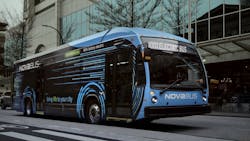Grand River Transit places initial electric bus order with Nova Bus
Grand River Transit (GRT) has placed an order for six electric buses from Nova Bus that are expected to arrive in spring 2023. The Regional Council of Waterloo in Ontario, Canada, approved the purchase of an initial six buses in 2022 followed by five additional buses in 2023.
The six Nova Bus LFSe+ vehicles are part of GRT’s two-year pilot project evaluating electric buses and will be charged at the new 305,000-sq.-ft. Northfield Drive Maintenance Facility in Waterloo, scheduled to start operations in September.
“This is a major step forward in our plans to provide a zero-emission transit system for our community,” said Tom Galloway, Region of Waterloo Councilor and chair of the Planning and Works Commission. “We are committed to exploring new technologies and solutions to contribute to the region’s climate change goals. We excitedly await the delivery of our first fully electric buses from Nova Bus and the opportunity to introduce our transit customers to the future of sustainable transit.”
Nova Bus President Martin Larose added, “We have always been very proud of providing robust and high-quality buses to transit authorities across Canada, and it’s an honor to be accompanying existing clients such as GRT in their transition with this first purchase of electric buses. We strongly believe our future lies in providing sustainable solutions for communities to enjoy zero-emission transit, which will ultimately improve quality of life for everyone.”
The Regional Council worked with the Canadian Urban Transit Research and Innovation Consortium (CUTRIC) to evaluate a fleet-wide transition to lower carbon fuels and identify potential route to effectively deploy electric buses. CUTRIC’s study found the region could save an average of C$21,000 (US$16,288) annually per bus and reduce emissions by 129.5 metric tons per bus by transitioning certain routes to electric vehicles.
While the region finalizes its zero-emission transition plan, it halted the purchase of diesel buses in 2021, opting for hybrid electric vehicles. GRT explains by taking a phased approach to its zero-emission transition plan, it can take advantage of the rapid developments and improvements in both the electric bus and battery markets.
The purchase of the Nova Bus LFSe+ vehicles was funded in part through the Investing in Canada Infrastructure Program (ICIP), Infrastructure Canada, the Ontario Ministry of Transportation and Region of Waterloo.
About the Author

Mischa Wanek-Libman
Group Editorial Director
Mischa Wanek-Libman is director of communications with Transdev North America. She has more than 20 years of experience working in the transportation industry covering construction projects, engineering challenges, transit and rail operations and best practices.
Wanek-Libman has held top editorial positions at freight rail and public transportation business-to-business publications including as editor-in-chief and editorial director of Mass Transit from 2018-2024. She has been recognized for editorial excellence through her individual work, as well as for collaborative content.
She is an active member of the American Public Transportation Association's Marketing and Communications Committee and served 14 years as a Board Observer on the National Railroad Construction and Maintenance Association (NRC) Board of Directors.
She is a graduate of Drake University in Des Moines, Iowa, where she earned a Bachelor of Arts degree in Journalism and Mass Communication.
